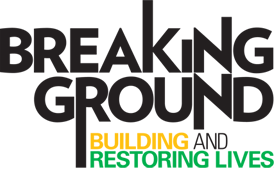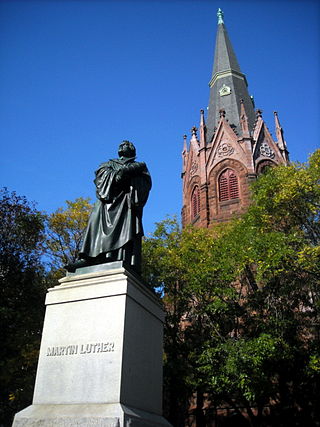Supportive housing is a combination of housing and services intended as a cost-effective way to help people live more stable, productive lives, and is an active "community services and funding" stream across the United States. It was developed by different professional academics and US governmental departments that supported housing. Supportive housing is widely believed to work well for those who face the most complex challenges—individuals and families confronted with homelessness and who also have very low incomes and/or serious, persistent issues that may include substance use disorders, mental health, HIV/AIDS, chronic illness, diverse disabilities or other serious challenges to stable housing.

So Others Might Eat (SOME) is a nonprofit organization that provides services to assist those dealing with poverty and homelessness in Washington, D.C. The organization provides affordable housing, job training, counseling and other healthcare services, and daily needs such as food and clothing to the poor and homeless. It spends the largest portion of its annual budget on affordable housing, with a majority of its residents recovering from addiction. SOME describes its mission as helping "our vulnerable neighbors in Washington, DC, break the cycle of homelessness through our comprehensive and transformative services".
Housing First is a policy that offers unconditional, permanent housing as quickly as possible to homeless people, and other supportive services afterward. It was first discussed in the 1990s, and in the following decades became government policy in certain locations within the Western world. There is a substantial base of evidence showing that Housing First is both an effective solution to homelessness and a form of cost savings, as it also reduces the use of public services like hospitals, jails, and emergency shelters. Cities like Helsinki and Vienna in Europe have seen dramatic reductions in homelessness due to the adaptation of Housing First policies, as have the North American cities Columbus, Ohio, Salt Lake City, Utah, and Medicine Hat, Alberta.

Compass Family Services is a 501(c)(3) non-profit organization in San Francisco, California, that provides a wide variety of human services to homeless and at-risk of homelessness families. In 2019, they served 6,000 parents and children. Its services include intake and referral to shelter, emergency shelter, transitional housing, and childcare—in addition to a broad spectrum of counseling, parenting education, prevention, and support services.
The Cathedral Shelter of Chicago was founded in 1915. It began as a storefront mission of the Episcopal Diocese of Chicago, attached to the former Cathedral of Sts. Peter and Paul, providing food and clothing to the poor and homeless. In 1920, they began offering substance abuse treatment. Under the leadership of Father David Gibson, an Episcopal priest, the shelter was of great importance during the Great Depression.

Breaking Ground, formerly Common Ground, is a nonprofit social services organization in New York City whose goal is to create high-quality permanent and transitional housing for the homeless. Its philosophy holds that supportive housing costs substantially less than homeless shelters — and many times less than jail cells or hospital rooms, and that people with psychiatric and other problems can better manage them once they are permanently housed and provided with services. Since its founding in 1990 by Rosanne Haggerty, the organization has created more than 5,000 units of housing for the homeless. "This is about creating a small town, rather than just a building," according to Haggerty. "It's about a real mixed society, working with many different people." Haggerty left the organization in 2011 to found Community Solutions, Inc. Brenda Rosen was promoted from Director, Housing Operations and Programs to Executive Director, and has led the organization since.

Homelessness, also known as houselessness or being unhoused or unsheltered, is the condition of lacking stable, safe, and functional housing. The general category includes disparate situations, such as living on the streets, moving between temporary accommodation such as family or friends, living in boarding houses with no security of tenure, and people who leave their domiciles because of civil conflict and are refugees within their country.

Luther Place Memorial Church is a congregation belonging to the Evangelical Lutheran Church in America. The neo-Gothic church building in Thomas Circle in Washington, D.C., was designed by architects Judson York, J. C. Harkness, and Henry Davis and constructed in 1873 as a memorial to peace and reconciliation following the American Civil War. Its original name was Memorial Evangelical Lutheran Church. The Luther Monument is situated in front of the church. The statue is a replica of the centerpiece of the Luther Monument in Worms, Germany, and was given to the church in 1884 by German emperor William I.

Northeast Kingdom Community Action (NEKCA) is an anti-poverty community action agency that helps people in Vermont's Northeast Kingdom meet their basic needs and become self-sufficient. The agency is a partner of the Vermont Department for Children and Families and is primarily funded by federal and state government resources.
House of Ruth, founded in 1976 and opened on November 21, 1977, is a non-profit organization that serves more than 600 women and children who are abused and homeless in Washington, DC.

Shepherds of Good Hope is a social service organisation based in Ottawa, Ontario. It is one of four homeless shelters in the city. Its client-base includes people of different faiths, beliefs and genders. This organisations provides three main services: Support Services, Supportive Living and Shelter Services. Shepherds of Good Hope also operates a soup kitchen, and serves breakfast, lunch and evening meals.
South Middlesex Opportunities Council, commonly referred to as SMOC, is one of the largest private, non-profit social services groups in Eastern Massachusetts. Operating in the Metrowest region of the state, the group provides homeless shelters, drug rehabilitation programs, family counseling handicapped transportation and numerous other social services. It was founded in 1966.
Berkeley Food and Housing Project is a nonprofit organization serving homeless men, women, and children in Berkeley, California and other parts of Northern California. BFHP is one of the largest homeless service providers in the East Bay.
HOPE Atlanta, the programs of Travelers Aid of Metropolitan Atlanta, is a non-profit organization that has served the metro-Atlanta area for 112 years. Since its inception in 1900, the organization has provided services to over one million people in need throughout the counties surrounding Atlanta, Georgia.
Transitional housing is temporary housing for certain segments of the homeless population, including working homeless people who are earning too little money to afford long-term housing. Transitional housing is set up to transition residents into permanent, affordable housing. It is not in an emergency homeless shelter, but usually a room or apartment in a residence with support services.
Bethesda Project is a nonprofit organization that provides shelter, housing, and programs reaching out to individuals experiencing homelessness in Philadelphia, Pennsylvania. From humble beginnings as a small group of volunteers, Bethesda Project has grown to provide care that encompasses emergency shelter, housing, and supportive services at 15 locations in and around Center City Philadelphia.
Community Housing Partnership is a nonprofit organization in San Francisco, California, that provides housing, job training and other services to people formerly living in homelessness. Founded in 1990, it owns and operates 14 residential buildings and collaborates with other organizations in its goals.
Family Promise is a national 501(c)(3) nonprofit organization in the United States, founded by Karen Olson in 1988. Family Promise primarily serves families with children who are homeless or at risk of homelessness, with the mission of "help[ing] homeless and low-income families achieve sustainable independence through a community-based response."

Our Community Place is a community center created by a former Salvation Army building located in Harrisonburg, Virginia, United States. The building was converted to a community center after Ron Copeland acquired ownership in 1999. After a lengthy renovation period, the center opened to the community in August 2008.








